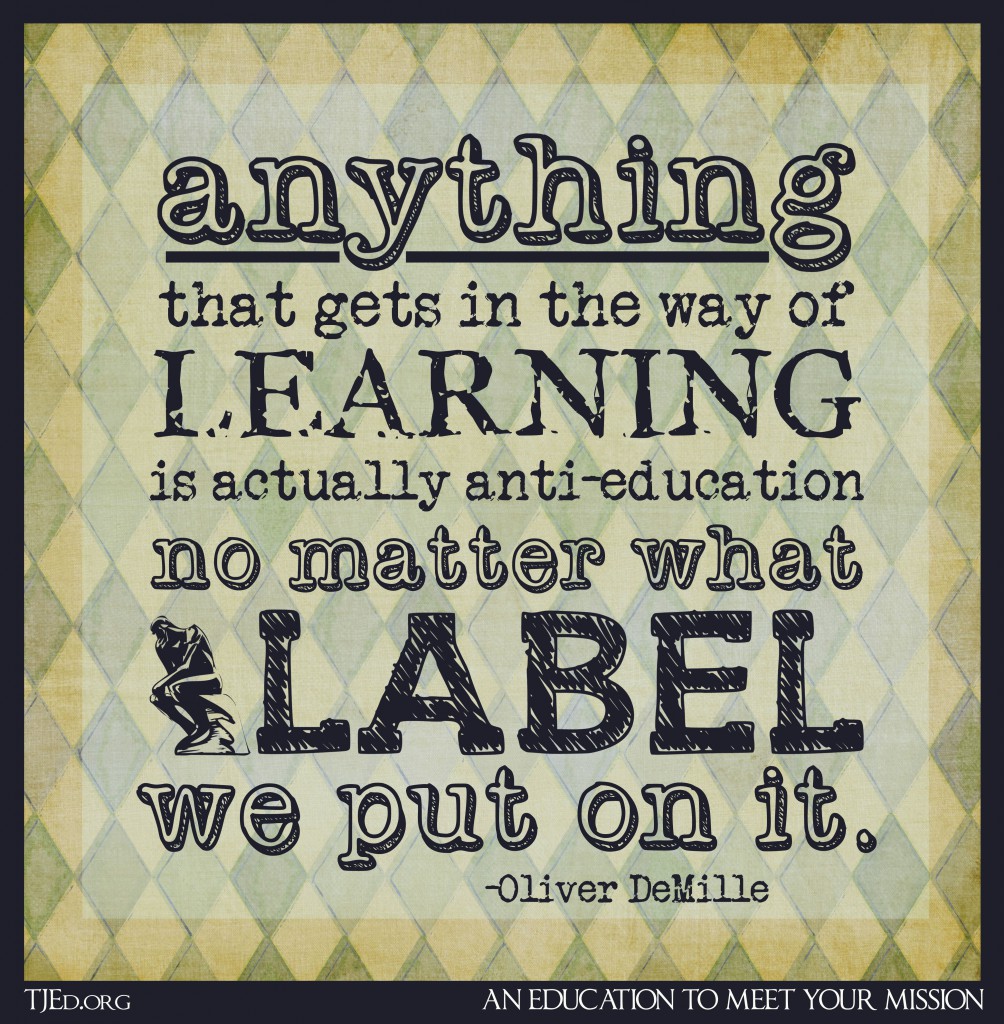Can You Like…
 “But, I thought you liked classics,” she asked me with obvious frustration. “And Common Core is full of classics—for the children of the whole nation to read! In your lecture, you called classics one of the 7 Keys of Great Teaching. Now you’re saying classics are a terrible idea? I don’t understand.”
“But, I thought you liked classics,” she asked me with obvious frustration. “And Common Core is full of classics—for the children of the whole nation to read! In your lecture, you called classics one of the 7 Keys of Great Teaching. Now you’re saying classics are a terrible idea? I don’t understand.”
She shook her head and took off her glasses. “Do you like classics or not?”
“You raise a good question,” I responded. “We need a lot more classics in our learning, in public, private and homeschools. Also in charter schools and universities, and adult reading. And, yes, Common Core has some classics.”
She was nodding her head.
“But here’s another question. Is it possible to like classics and not like Common Core?”
I paused. Then waited…
“I…guess so,” she replied, not very convinced. “But why? Do you object to some of the books on the list?”
“Yes. And to the lack of some very important ones as well. But that’s not my point. My objection to Common Core goes much deeper.”
The Important W
I could tell that she didn’t like the idea that anyone would object to Common Core, for any reason, and she was shaking her head again. I rubbed my chin and said slowly, “My concerns with Common Core are John Dewey’s concerns with it…”
Again, I waited. I could see the battle churning in her head. “Dewey…?” she finally asked, obviously confused.
“Yes, Dewey. Of course, he wasn’t alive when Common Core came out, so we don’t know exactly how he would have felt about it.” Laughter from the audience didn’t distract her. She was focused on every word.
I continued. “But one of Dewey’s most profound teachings was that what we teach students, the curriculum, the content, isn’t nearly as important as the way we teach them, the environment of learning. Montessori taught the same thing.”
She stopped shaking her head. She cocked it slightly, unclear where I was headed.
“And the way Common Core is promoted is all wrong. First, it’s a government program. Why not make it a private program, a list of great classics and materials everyone can learn from or use as a resource guide? Second, it’s ultimately a federal program. Why not leave it to parents to select from the list? Or, for parents who want the schools to do it, why not leave it to local school boards?
“Teaching Common Core as a top-down, government-controlled program from Washington DC or even the state government sends all the wrong messages. It teaches students, parents, teachers, and administrators the wrong lesson: ‘The government knows best. Now sit down, be quiet, and obey us. Right now.’
What to Be
“That’s the Dewey-lesson. And it’s a bad one. Think about it! This is a terrible lesson to teach the youth in a democratic republic. It’s the opposite of teaching them how to genuinely think. Why would we do it this way?
“Third, it’s a forced list. Just make it a resource tool. If a parent hates a certain book on the list, he or she should be able to just ignore it and choose something better. Forced education is the opposite of great learning.
“Fourth, why do we call it Common Core? Who wants to be common? We might as well call it Mediocre Core, or Lower-Middle-Class Core. I get that there are other meanings to the word, but “common” can reinforce the wrong lesson. Dewey was right about this. Call it the Genius Core, and just see how many parents leap to share it with their kids—as long as it’s not forced by Washington.
“Or, better still, let’s beef up the list, get rid of the government mandates, and call it the Classic Core. Or get Harvard or the Bill and Melinda Gates Foundation to sponsor it and call it the Harvard Core or the Billionaire’s Core…. Parents, schools and teachers will flock to use it.
“But keep it a resource guide, not a forced list, and get government out of it. Or, at most, leave it or local school boards.”
The Real Goal
The room was excited now, with cheers punctuating some of the ideas. The woman was taking notes, not entirely convinced, I think, but interested.
“What’s our real goal, after all? Is it schooling, or learning? Government programs, or great education? We need to get clear on this. Then, once the focus is clearly on great learning, we’ll be more likely to provide the best Great Learning Core list and recommend it to more people. Or get educational supporters like Peter Thiel or Khan Academy to give cash prizes to schools and scholarships to students and parents who excel using the ‘Genius Core’ list or the ‘Harvard Core’ list.”
“Make these few changes that I’ve suggested, and Common Core won’t just be another bad policy like No Child Left Behind that promotes more aggressive rote testing, more rigid thinking, and teachers who focus more on paperwork rather than their students. In fact, like I’ve said, get rid of Common Core and go find your own Classics Core. That’s the way to emphasize the classics.”
I paused to take a breath.
“Yes, I absolutely believe our learning environments at all levels need a lot more classics. A lot more! And a lot more often! But not the way Common Core does it. That’s the opposite of what we should do….”
Want an alternative to Common Core? Check out these offerings >>



































Common core is sponsored by Bill Gates.
After years of receiving your newsletter, I am becoming increasingly uncomfortable with the way our government is negatively portrayed by TJEd. I question whether our founding fathers would approve. However, Common Core is NOT from Washington, DC. You may want to educate yourself on Common Core rather than perpetuate misleading information. Common Core was developed by state leaders, teachers, and parents from 48 states in a thorough and painstaking process with the intent being the highest standards, and also consistency (hence the name “common”). The focus is on critical thinking, analytical thinking, and problem solving. These high-order skills are crucial to American student success. I’m sure Dewey would approve.
For more information, visit:
http://www.corestandards.org/
Just what I have always thought…wonderfully put into an essay! I have been in a lot of schools in two countries and various provinces and states. My experiences have always led me to the conclusion the schools were best with the power in the hands of the parents and local school boards. The higher up the ladder the decisions are made…the more paperwork for the teacher there is and the less motivation there is to be exceptional.
I am no big fan of the common core and have plenty of concerns about it, but this sort of commentary makes it impossible to have a real, substantive discussion and makes homeschoolers look incredibly ignorant. Have you READ the standards? Here is one that might be relevant to your point:
CCSS.ELA-Literacy.RL.3.2
Recount stories, including fables, folktales, and myths from diverse cultures; determine the central message, lesson, or moral and explain how it is conveyed through key details in the text.
Where within it do you see a forced list or a selection of books that teachers are required to teach that gives school districts no choice regarding content? And why is asking kids to do this such a problem? Others standards ask you to compare stories by the same author or to talk about parts of a story, poem, or play. I have read through all of the standards for every grade and no where within them did I see a list of works that the government is requiring kids to read.
Are you conflating the Common Core with the Core Knowledge Foundation? That is a separate and private organization founded in 1986 that provides a curriculum for schools based on the Common Core in what they consider an ideal implementation of the standards. If you want to take issue with the extensive book lists and workload, go there.
An COMMON here means “belonging equally to or shared alike” — with the idea being that kids could move from one side of the country to another and have some continuity in their education, not “of mediocre or inferior quality; mean; low” The standards, might, in reality, create an inferior form of education, but that is not the intended meaning, as you suggest here.
As I said, I have many, many concerns about the common core, but I cannot take any argument against them seriously when it fails to cite even one line from the primary source. This is particularly problematic coming from a site that has advocates close reading, critical thinking, and careful analysis. I see none of that here.
I love the line about “government knows best, sit down and shut up.” It seems we hear more and more of that today. It’s as if some people want the government to think for them. That’s not what democracy is all about!
And for the record, we, too, have chosen to homeschool and I also value reading and teaching quality literature (I have a PhD in British Literature). Concerns with the Common Core are just one of many reasons we have chosen to do so.